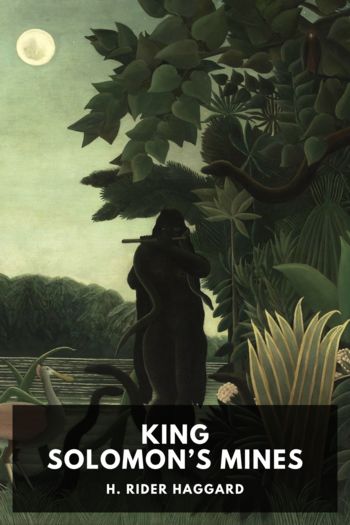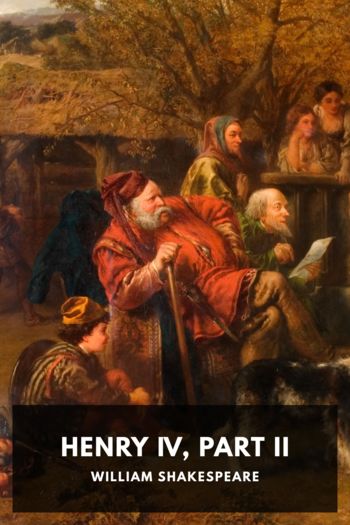King Solomon’s Mines - H. Rider Haggard (best life changing books .TXT) 📗

- Author: H. Rider Haggard
Book online «King Solomon’s Mines - H. Rider Haggard (best life changing books .TXT) 📗». Author H. Rider Haggard
“Let us go,” said Sir Henry in a low voice; “stay, we will give him a companion,” and lifting up the dead body of the Hottentot Ventvögel, he placed it near to that of the old Dom. Then he stooped, and with a jerk broke the rotten string of the crucifix which hung round da Silvestra’s neck, for his fingers were too cold to attempt to unfasten it. I believe that he has it still. I took the bone pen, and it is before me as I write—sometimes I use it to sign my name.
Then leaving these two, the proud white man of a past age, and the poor Hottentot, to keep their eternal vigil in the midst of the eternal snows, we crept out of the cave into the welcome sunshine and resumed our path, wondering in our hearts how many hours it would be before we were even as they are.
When we had walked about half a mile we came to the edge of the plateau, for the nipple of the mountain does not rise out of its exact centre, though from the desert side it had seemed to do so. What lay below us we could not see, for the landscape was wreathed in billows of morning fog. Presently, however, the higher layers of mist cleared a little, and revealed, at the end of a long slope of snow, a patch of green grass, some five hundred yards beneath us, through which a stream was running. Nor was this all. By the stream, basking in the bright sun, stood and lay a group of from ten to fifteen “large antelopes”—at that distance we could not see of what species.
The sight filled us with an unreasoning joy. If only we could get it, there was food in plenty. But the question was how to do so. The beasts were fully six hundred yards off, a very long shot, and one not to be depended on when our lives hung on the results.
Rapidly we discussed the advisability of trying to stalk the game, but in the end dismissed it reluctantly. To begin with, the wind was not favourable, and further, we must certainly be perceived, however careful we were, against the blinding background of snow, which we should be obliged to traverse.
“Well, we must have a try from where we are,” said Sir Henry. “Which shall it be, Quatermain, the repeating rifles or the expresses?”
Here again was a question. The Winchester repeaters—of which we had two, Umbopa carrying poor Ventvögel’s as well as his own—were sighted up to a thousand yards, whereas the expresses were only sighted to three hundred and fifty, beyond which distance shooting with them was more or less guesswork. On the other hand, if they did hit, the express bullets, being “expanding,” were much more likely to bring the game down. It was a knotty point, but I made up my mind that we must risk it and use the expresses.
“Let each of us take the buck opposite to him. Aim well at the point of the shoulder and high up,” said I; “and Umbopa, do you give the word, so that we may all fire together.”
Then came a pause, each of us aiming his level best, as indeed a man is likely to do when he knows that life itself depends upon the shot.
“Fire,” said Umbopa in Zulu, and at almost the same instant the three rifles rang out loudly; three clouds of smoke hung for a moment before us, and a hundred echoes went flying over the silent snow. Presently the smoke cleared, and revealed—oh, joy!—a great buck lying on its back and kicking furiously in its death agony. We gave a yell of triumph—we were saved—we should not starve. Weak as we were, we rushed down the intervening slope of snow, and in ten minutes from the time of shooting, that animal’s heart and liver were lying before us. But now a new difficulty arose, we had no fuel, and therefore could make no fire to cook them. We gazed at each other in dismay.
“Starving men should not be fanciful,” said Good; “we must eat raw meat.”
There was no other way out of the dilemma, and our gnawing hunger made the proposition less distasteful than it would otherwise have been. So we took the heart and liver and buried them for a few minutes in a patch of snow to cool them. Then we washed them in the ice-cold water of the stream, and lastly ate them greedily. It sounds horrible enough, but honestly, I never tasted anything so good as that raw meat. In a quarter of an hour we were changed men. Our life and vigour came back to us, our feeble pulses grew strong again, and the blood went coursing through our veins. But mindful of the results of overfeeding on starved stomachs, we were careful not to eat too much, stopping whilst we were still hungry.
“Thank Heaven!” said Sir Henry; “that brute has saved our lives. What is it, Quatermain?”
I rose and went to look at the antelope, for I was not certain. It was about the size of a donkey, with large curved horns. I had never seen one like it before; the species was new to me. It was brown in colour, with faint red stripes, and grew a thick





Comments (0)